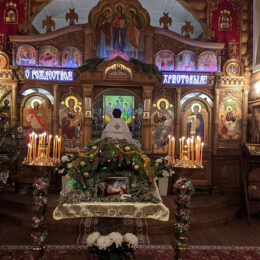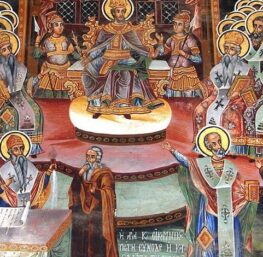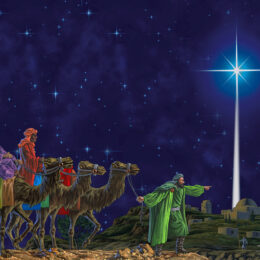![]() by Met. Athanasios of Limassol –
by Met. Athanasios of Limassol –
By their prayerful experience, the holy fathers of the Church have proved that every time we stand before God in prayer in church or in our own homes, this standing has two characteristic features. It fills us with joy, because we are witnessing God’s great love for man. Our heart yearns to express great gratitude to God, as each of us, according to his own measure, feels this gift of the Lord to His creation.
But at the same time, this standing before God is also a judgment for us, especially on this holy feast, as on all great feasts and days connected with the events of the life of our Lord Jesus Christ. But of course, the deepest meaning of these events and feasts is certainly not the condemnation of man, but his salvation.
And now, experiencing the joyous event of the birth of our Lord Jesus Christ, we feel this great Divine love for us, and our hearts tremble with the greatest gratitude to God for all His bounties and blessings sent down to mankind, but the main thing for us—and this brings practical benefit to our spiritual state—is the judgment over ourselves. As the apostle Paul says: “If we condemn ourselves before God, we won’t be condemned by Him” (cf. 1 Cor. 11:31). If we condemn ourselves in this temporal life, we won’t be condemned on the “last day,” because our judgment already took place in this world.
Thus, we become witnesses and participants in the celebration of Nativity; we participate in this special Nativity atmosphere, which disposes us to carefully examine and judge ourselves from the point of view of what the Lord did for our salvation, for we know that God did not create anything accidentally and aimlessly, but, being the Lord of history, all events that occur in the world are directed towards our salvation. Thus, God willed and deigned that all events should take place with amazing accuracy. For example, He wanted to be born in a specific year, in a specific way known to us, in a particular country and city and even in the manger that we all know. His Nativity was preceded and accompanied by events described in detail in the Gospel.
Whenever the holy fathers were perplexed or tempted, they set themselves before the life of Jesus Christ, condemning themselves. I would like to believe that a Christian is he who imitates the life of Christ according to the strength of his human abilities, and covers what he cannot fulfill with repentance and humility—the virtues of spiritual work.
In these holy days of Nativity, filled with such rich hymns, the Church constantly glorifies Christ for His sacrifice that He offered for our sake, which is incomprehensible to the human mind. These hymns gradually reveal the theological depth and meaning of the Nativity, which for virtuous monks and laymen become not just an experience of the event, but even a vision of and participation in it. When Elder Ephraim of Katounakia returned from Jerusalem, we were waiting for him to tell us his impression of Golgotha, of the place of the Crucifixion. How surprised we were when he told us that he was very moved by the cave in Bethlehem. When he beheld this meek, humble cave, which so touched him, he said to himself: “Before visiting the Bethlehem cave, living on Mt. Athos in the rocky, inaccessible Katounakia desert, in a modest cell that could barely fit even the most necessary things, I had the thought that I was something. Now, having seen the place where God Himself, Jesus Christ was born, I feel all of my nothingness, for I see how God humbled Himself, being born in such a small cave—a pen for animals, where barely any place could be found for Him.”
Christ, born in a den, persecuted and despised by all, thereby accomplished the greatest event in the history of mankind; His Incarnation took place in absolute silence, in humility and obscurity, and of all mankind, but a few Persian magi and simple shepherds were informed of the coming of God Himself into the world. God—and extreme poverty and humility! And if we truly want a correct view of ourselves and a true judgment of our conscience, then every time that life starts to torment us with worldly desires and demands, we must place ourselves before this humble Bethlehem cave, before the event of the Incarnation, and reflect upon what we are doing and whether our life and our deeds correspond to the life of Christ and what He did for us, becoming incarnate. We can thus judge our entire life.
From the moment that God became man and the angels sang: Glory to God in the highest, and on earth peace, good will toward men, the word of God declares to us: “I came to earth not to bring peace, but a sword” (cf. Mt. 10:34). Why did Christ bring a sword rather than peace if the angels sing: “and on earth peace?” Of course, the peace that came to earth is Christ Himself, Who became man, Whom we can now love as both God and man. Christ showed us that our relationship with God is not something amorphous and theoretical, because it’s impossible to love just an idea. A person may be a zealous follower of some philosophy, but he will never be able to develop and acquire true love for God and man following this system, because the system itself will never be able to love him.
In the Church, the exact opposite happens. Here we have no mutual relations with any theory, and the Word Himself has not become any theory or philosophy, but the Word was made flesh (Jn. 1:14). The Word—Jesus Christ—Himself became Man, so that we might be able to love Him. When we will be in a state to love God and this love awakens our hearts, then we will understand that God anticipated us with His love in an incomprehensible way. We love Him, because He first loved us, says the apostle Paul. This is the mystery and the plan that is laid down in the Church. Therefore, Christ, as the peace that came into the world, became an object of love, not of faith, because in due time, it will be necessary to surpass both faith and hope, to remain only in love. According to the apostle Paul, at the end of existence, faith and hope will be abolished and only love will remain (cf. 1 Cor. 13), because only love is an experienced, ontological action, by which a man feels that he is united with God. This was the direction that all the saints took; and from the moment that Christ was born, they loved Him with all the strength of their souls.
The Protomartyr Stephen bowed his head under this Divine love and thereby became like the Lord Himself. The Acts of the Apostles says that when he was seized for preaching the name of Jesus, during the trial and his confession before the tribunal, his face shone like that of an angel. The Jews sentenced him to death. Having brought him to the place of his execution, they stoned him to death—which the Mosaic Law commanded to do with wicked and very sinful people. But although his death was terrible, the Protomartyr Stephen, filled with the Holy Spirit, prayed not for himself, but for the whole world, as did Christ, Who said, towering over the universe on the Cross: Lord, don’t hold this sin against them! From the moment that Christ came to earth and brought peace, millions of martyrs have given their lives for this faith in Him because they loved Christ and tasted His great love in return; because the love of Christ spoke in the hearts of these people.
I would like to note that the memory of the saints whom we celebrate daily is not a day of suffering or simply counting from the day of their repose, as happens with ordinary reposed people, but, when we celebrate the service to a martyr or a venerable monastic, the events of their lives happen again in the present, because the events of Church feasts have always been a criterion and judgment for them. They weighed, measured, checked, and judged their lives, comparing them with the life of Christ, and whether they conform to it as His followers. The saints were very attentive on these days: They tried to delve into the depth of the meaning of the Church hymns for the feasts, they read what the Gospel and fathers of the Church wrote about it, and they reflected on what was happening. For example, they pondered over the fact that the Creator of the universe diminished Himself down to infancy; that only had He just been born and they were already searching for Him to kill Him; that for the King of the World no place other than a modest cave was found; that His birth itself was in complete obscurity, humility, and poverty. The saints compared their acts, the conditions of their lives, their desires, their humility, thinking: “If Christ was so humble, so patient, suffered persecution, then why shouldn’t I, following His example, endure the sorrows of this life?”
The Lord clearly gave us to understand and feel through the experience of the apostles and all the saints that it is impossible for the Holy Spirit to be present in us without the accompanying gifts and fruits of the Spirit. So that we wouldn’t have any excuses, the Lord clearly enumerated the fruits of the Holy Spirit: love, joy, peace, longsuffering, gentleness, goodness, faith, meekness, temperance (Gal. 5:22-23), righteousness, truth, holiness. Thus, examine yourselves, and if you have these gifts, it means you have the Holy Spirit within you. We have to examine ourselves and understand what stage we are at. This judgment is both necessary and salvific for every Orthodox Christian.
And may these holy days pass as a judgment over our conscience, our entire lives, and our actions, because only then will we be able to say that they were unto our salvation, because they provided us with the means for spiritual struggle in repentance, humility, and a change of life, and at the same time, encouraged us to turn to God, to entreat His great mercy with humility and love.
If we feel that we are the “people which sat in darkness and the shadow of death,” then we can also say, “The people sitting in darkness saw a great light, and the light shone to those sitting in the land and shadow of death” (cf. Mt. 4:16). O God, upon whom will the light shine if not those who live in darkness? If I truly feel that I am in darkness, then I surely will seek the light. If I am in delusion and I think I am in the light, then I surely will not behold the true light, for I have a created light in my hands.
This sermon was delivered by Metropolitan Athanasios of Limassol on the feast of the Nativity of Christ—December 25, 2018 [n.s.], celebrated by the Church of Cyprus according to the new calendar.
—————————————————
HT: Orthodox Christianity. (Minor organizational edits and bolding of key phrases done by blog editors done to enhance readability.)
![]()



